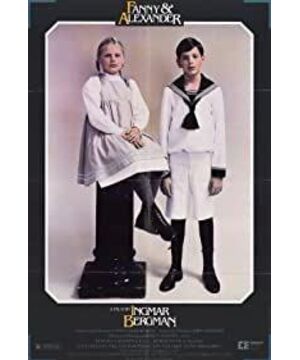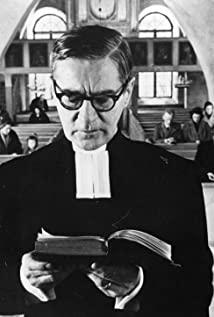The film tells the author's understanding of family affection, control, drama, religion, and death.
When the film opens, Bergman shows us the home of Alexander's grandmother, Helena. It was an old house full of chandeliers, antiques, furniture, paintings and all kinds of colors. On the eve of Christmas in 1907, the festive season added countless flowers and candles to the original splendid hall. The shiny tableware and well-arranged dishes showed that the owner not only lived a rich life, but also had a very elegant taste.
In such a room filled with art everywhere, the little protagonist Alexander was introduced. He curled up in the corner of the room, playing a paper figurine play as if nothing had happened. The princesses, princes, ministers, and swordsmen on the small stage were moved around by him, and the relaxed and skilled appearance was exactly the same as when Bergman dispatched various members of the Akda family to his hands. The characteristics of the play are found in Helena's home, as well as the identity of the inhabitants. Alexander's father, Oscar, is the manager of the Ai family's ancestral theater. Although his acting skills are not as superb as his wife Emily, he often can't help but want to make a cameo appearance on stage. After the Christmas dinner, the master and servant of the Ai family were in a fit of anger, holding hands and singing and dancing in the restaurant. It was even more obvious that Helena's house was used as a stage.
Oscar passed away shortly after. However, his soul, as it was in his lifetime, still lingered in his own house, and sometimes even had a heart-to-heart chat with his mother, which lasted most of the night. Bergman deals with these paranormal phenomena with a very calm and natural attitude. At first he also pointed out Alexander's confusion, but after a while, even the child didn't care about his dead father being among the living. Life and death are a topic that can be discussed on the stage at the same time, so why is it surprising that life and death coexist in a drama family?
After Emily remarried, the Alexander brothers and sisters fell into a cold black and white from a colorful world. The bishop's mansion in Bergman's lens, although the building is only black and white, the people in the building have the same heart as their clothes, and only know how to use the black and white dichotomy to define everything in the world. In such a chilling and grim environment, Alexander passed the time by weaving stories. In a scene in which he told a female chef (played by one of Bergman's actresses: Harry Anderson) about the repeated appearances of ghosts in the castle, the director, with the help of no lighting and soundtrack, still created a scene that is unbelievable in film history. The shivering light is terrifying by day and day.
The gossip then reached the bishop's ears. He called Emily and Alexander into the temple of God together, and with the logic and authority unique to religion, peeled off the secrets of the latter one by one. Under the double pressure of his mother's pleas and the bishop's torture, Alexander finally had to bow his head and confess his guilt. Bergman's handling of this scene of moral judgment is only so rational and the rhythm of the attack is so precise that it makes people deeply feel that religion is really the most terrible executioner that stifles the human imagination.
The third segment of "Fin" takes place at the home of Jewish antiques dealer Isaac Jacobi. At this time, the Alexander brothers and sisters had just been smuggled out of the bishop's mansion like luggage and hid them here. Since the stay was both secretive and temporary, Alexander was happy to spend time in the Jia family's warehouse. In the warehouse, all kinds of toys are miscellaneous. The Jia family, who know magic, can make statues nod and puppets dance. Alexander couldn't help the temptation, and followed Ishmael to learn a superficial telepathy technique, which he used on the critically ill bishop, and actually set his bed on fire. There is nothing new about magic itself in this section, but Bergman did not give any hints before it came, and the time was fleeting, so the suspense that caused the audience to expect it to happen at any time was what was interesting.
To sum up, the three houses in "Fen" represent drama, religion and magic respectively. These three things are actually the summary of the master's life career. Compared with his previous works, "Fanny and Alexander" is undoubtedly the most gorgeous and romantic. The scene in the first paragraph is bright and clear, and it is so beautiful that it makes people move, but at this time, because there are too many relationships between blood, in-laws, masters and servants, friends and lovers, it is necessary to explain, and the play is inevitably scattered. After the middle section, arrogant, narrow-minded and tyrannical characters appeared one after another, and the film began to focus slowly.
There are two different families in "Fanny and Alexander", one is the Ekdahl family of Alexander's biological father, and the other is the family of Alexander's stepfather. These two families have two completely different attitudes to life. The Ekdahl family is cheerful, generous and inclusive. (Even love can be a threesome!!), life is only ten years old, what is the use of worrying too much; on the contrary, Alexander's stepfather has a strong desire to control his family, and he firmly grasps the people around him In his hands, he did not know that the original trust and affection among his relatives had been lost from his fingers.
If you want to imprison others in a cage, you will imprison yourself in it; so did Alexander's stepfather, and Alexander, who hated his stepfather, did the same.
In the interview documentary "Bergman Trio", director Bergman admitted that Alexander was his incarnation, and in the dialogue between him and his stepfather or at the beginning of the film, Alexander hid under the table of his grandmother's house, and the statue in the hall suddenly moved. , followed by the sound of the scythe dragging across the floor, and when I looked up, I saw the figure of Death... The director said that these paragraphs and pictures are all his personal experience.
Alexander has a passion for drama, a fascination with death, and a delicate observation of things; as well as a wild imagination and a heart of storytelling, I can fully imagine that Alexander will become a great director in the future.
8 points.
View more about Fanny and Alexander reviews











